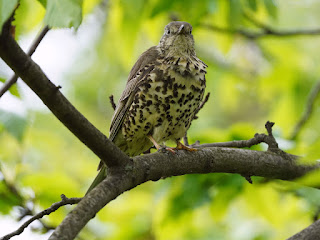A male Blackcap is looking very tatty after bringing up his family, but is still singing cheerfully.
The female Coal Tit in the Flower Walk who comes to my hand is also looking badly worn.
But the young birds are very smart in their brand new feathers. This is one of the young Great Tits waiting to come down for a pine nut.
Young Blue Tits are grey rather than blue.
A Wren looked at a passing midge.
This Robin beside the Long Water will take pine nuts from the ground, but is still nervous about humans.
A Mistle Thrush stared down mistrustfully from a chestnut tree. Most of the Mistle Thrushes we see are winter migrants, and only a few pairs stay in the park to breed. I don't think any have succeeded in raising young this year, as their nests are predated by Carrion Crows and Magpies.
The Magpies themselves have been doing very well and there are several families. This is a teenager, one of three, with a parent below the Triangle car park.
Five Grey Herons could be seen near the bridge, keeping a wary distance from each other to avoid a fight.
Another was fishing in the Italian Garden. The rail is about 18 inches above the water, but the bird's long neck and perfect balance allow it to reach down and grab a fish out of the water without losing its grip.
Cormorants are returning, a sign that this year's young fish are growing to a reasonable size.
The Coots who built the nest in deep water at the Dell restaurant can't stop adding to it, and it's getting ridiculously tall. They are now using moulted goose wing feathers as a structural material. The sunshine allows you to see the enormous foundations.
The Coot family at the bridge gathered on their nest.
The oldest brood of Egyptian goslings are now beginning to grow flight feathers, though it will be several weeks before they start trying to fly. (There is one older single Egyptian gosling from other parents.)
A female Mandarin was basking contentedly at the Vista. She has no right to look so pleased with herself after neglecting her ducklings and losing every one of them.
The lavender in the Rose Garden is thick with bees. This is a Common Carder.














I wonder how the young Great Tit learned to take pine nuts from your hand: from watching its parents doing it?
ReplyDeleteThe bird parents are looking very sadly disheveled. Bringing up young must be a terrible, terrible burden.
Magpies don't have natural predators over there, right? Over here only Great Spotted Cuckoos sort of control the population by destroying magpie eggs and laying their own.
Tinúviel
The young tits must have often seen their parents collecting pine nuts and bringing them over, so it was a natural step to go and get their own.
DeleteWe only have Common Cuckoos here, and they are in sharp decline. I suppose the larger raptors could take a Magpie if they wanted to, but with so many Feral Pigeons to eat they don't bother.
Where have the cormorants been?
ReplyDeleteMy guess is on the Thames, where there are Cormorants everywhere there is room for them to stand. But who knows?
Delete